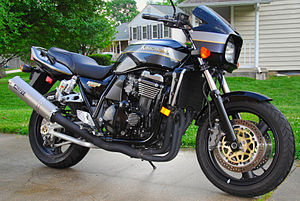 ZRX1100R model | |
| Production | 1997-2000 |
|---|---|
| Successor | Kawasaki ZRX1200R |
| Engine | 1,052 cc (64.2 cu in) liquid-cooled inline four 4 stroke |
| Bore / stroke | 76 mm × 58 [1] mm (3.0 in × 2.3 in) |
| Top speed | 230 km/h (143 mph) [2] |
| Power | 72 kW (96 hp) [3](rear wheel) |
| Torque | 69.3 lb⋅ft (94.0 N⋅m) [4](rear wheel) [4] |
| Transmission | 5 speed, chain |
| Brakes | Front: 2× 310 mm discs, 6-piston calipers Rear: 250 mm disc |
| Tyres | Front: 120/70-17 Rear: 170/60-17 |
| Wheelbase | 1,450 mm (57 in) |
| Seat height | 790 mm (31 in) |
| Fuel capacity | 20 L (4.4 imp gal; 5.3 US gal) |
The Kawasaki ZRX1100 was a standard motorcycle made by Kawasaki from 1997 to 2000 with an engine loosely based on the ZX-11. [5] It replaced the Zephyr 1100. Since the Zephyr 1100 sold poorly in the US, the ZRX1100 was not initially sold in that market until 1999. [2] [3] In 2001, the ZRX1100 was replaced by the larger engined ZRX1200, that were sold in the US until 2005. They were updated in 2008 and still sold in Japan as the ZRX1200 DAEG model until 2016. The Japanese only "Final Edition" model was sold until 2017. [6] [7]
The ZRX1100 and the later ZRX1200 were styled like 1980s muscle bikes, which were large bikes with large engines. They were also considered Universal Japanese Motorcycles. [2] The Suzuki Bandit 1200 has been credited with leading this niche, taking a large-displacement from an early air/oil-cooled engined race replica sport bike and detuning the engine for greater low-rpm torque and easier riding, replacing the aluminum frame with steel, and leaving off the full fairings, lowering cost while losing road racing focus in favor of all-around street sport riding. [8] One of the colour schemes replicates Eddie Lawson's 1981 and 1982 AMA Superbike Series-winning Kawasaki KZ-1000s. [3] [9] There were several models, such as the R which had a bikini nose fairing, with a square headlight.

The ZRX1100 had a top speed of 230 km/h (143 mph), and 0 to 1⁄4 mile (0.00 to 0.40 km) time of 11.19 seconds at 120 mph (190 km/h), and a 0 to 60 mph (0 to 97 km/h) time of 2.9 seconds. [2] [3]
See also
References
- ^ Kawasaki service manual
- ^ a b c d Edwards, David (December 1997), "Big Dogs; It's a Replica Replica; it's the ultimate UJM; it's a damn nice bike; it's the Kawasaki ZRX 1100 and it's coming our way… maybe", Cycle World, Newport Beach, California: Hachette Filipacchi Media U.S., p. 43, ISSN 0011-4286
- ^ a b c d "Best Used Bikes; Kawasaki ZRX1100 Best Standard 1999 Ten Best Awards", Cycle World, Newport Beach, California: Hachette Filipacchi Media U.S., p. 68, November 2009, ISSN 0011-4286
- ^ a b "Performance Index Winter '12/'13 Edition" (PDF), Motorcycle Consumer News, Bowtie Magazines, January 2013, archived from the original (PDF) on 2016-12-29
- ^ Trevitt, Andrew (June 30, 2010). "Kawasaki ZRX1100: GREEN MEANIE". Sport Rider. Retrieved July 8, 2017.
- ^ Dirck Edge (December 12, 2008), "Kawasaki ZRX1200 DAEG: A Thoroughly Modern UJM", Motorcycle Daily
- ^ "Product Lineup". Kawasaki. 2017. Archived from the original on May 24, 2015. Retrieved July 8, 2017.
- ^ Brown, Roland (2005), The Ultimate History of Fast Motorcycles, Bath, England: Parragon, p. 308, ISBN 1405454660
- ^ Edwards, David (December 1997), "Replica Report; Fast Eddie and the Big Green Kwackers", Cycle World, Newport Beach, California: Hachette Filipacchi Media U.S., p. 43, ISSN 0011-4286
